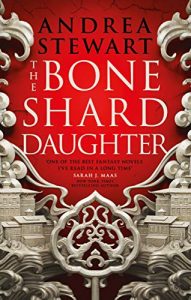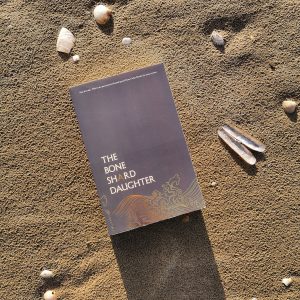THE BONE SHARD DAUGHTER by Andrea Stewart (BOOK REVIEW)
On the face of it, Andrea Stewart’s debut novel The Bone Shard Daughter is an escapist’s dream.
We’re transported to an Earthsea-like archipelago of shifting islands, where an Empire demands a tithe of children’s bones for the Emperor’s magic which, supposedly, in turn protects the people. There are secrets and mysteries galore in this South-East Asian-inspired world.
And quite possibly the cutest animal companion ever. I’m sure everyone’s heard of Mephi by now, right?
But beneath all the epic-fantasy fun run themes of colonialism and control; “Who controls the past controls the future: who controls the present controls the past” echoed in my mind with this Orwellian Emperor who sees all and controls knowledge.
Let’s take a take a step back from there for a moment, though.
 I was immediately swept up by Lin’s story; right from the opening page, this unusual character and her relationship with her father hooked my interest straight away and I needed to know more. What’s all this business about keys? What’s this childhood illness she had? What’s the deal with this foster brother chap and who put that stick up his arse? What’s a construct? Stewart presents the mystery of Lin, her amnesia and her competitor Bayan, in a way which is compelling rather than (as it so easily might have been) confusing.
I was immediately swept up by Lin’s story; right from the opening page, this unusual character and her relationship with her father hooked my interest straight away and I needed to know more. What’s all this business about keys? What’s this childhood illness she had? What’s the deal with this foster brother chap and who put that stick up his arse? What’s a construct? Stewart presents the mystery of Lin, her amnesia and her competitor Bayan, in a way which is compelling rather than (as it so easily might have been) confusing.
I loved running through the palace with Lin in this opening chapter, dodging the constructs, discovering this magic based upon commands. Her personality shone from the page. From the off, I was rooting for her as she invites us into her world and makes co-conspirators of us as she sneaks over the palace walls. It was incredibly immersive – so much so, that the introduction of a new point-of-view character in chapter two actually came as a surprise.
This is possibly the first time I’d ever struggled with a multiple PoV narrative. I’m not sure if it’s because I hadn’t expected it (the blurb and all the hype up to that point had focused solely on Lin), or because I’d been so compelled by Lin’s narrative; perhaps a mixture of both. I didn’t struggle for long, and soon fell into the rhythm of the story unfolding. There are five PoVs all told; as well as Lin there is Jovis, a smuggler who becomes a reluctant hero; Phalue and Ranami, lovers whose relationship is tested by social inequality and rebellion; and finally Sand, a woman slowly awakening and questioning her mysterious surroundings. With the introduction of each new perspective, Stewart masterfully draws you into each narrative. There are no dumps of exposition explaining what is happening, instead there are invitations to keep reading and find out for yourself;
But “enough” would never get me what I truly needed. I’d heard a rumour at the docks, a whisper of a disappearance similar to my Emahla’s, and I’d be cursing myself the rest of my life if I didn’t suss out the origins.
(Yep, if anyone’s playing Beth Review Bingo – it’s a first person narrative, which is probably why I found it so immersive)
Each narrative presented a very different view of this world and the struggles of its inhabitants at many levels. Each narrative is distinct, each character complex; and yet whilst remaining separate for so long, when they are finally woven together , they do so seamlessly. It was a beautifully complimentary multi-view that worked so well.
Having said that, Lin’s narrative was still my favourite. I know, I’m a dog with a bone here (sorry not sorry), but hers was definitely the mystery that grabbed me the hardest. It’s with Lin we experience most of the magic in Stewart’s world, and I found it such a unique concept. The Emperor is able to create animal servants by inscribing commands upon shards of bones and inserting the bones inside them. It put me very much in mind of artificial intelligence and writing code (not that I’m very knowledgeable in that department, but I kind of absorb some things from my developer husband). [Read more about this in my interview with Stewart here.] This blurring of genres, of a typically science-fiction element presented in this fantastical manner, was brilliant. Coupled with the secrecy the Emperor cloaked this magic in, the way he with-held information and hoarded the knowledge for himself, brought a distinctly dystopian feel to an otherwise Imperialistic story.
He said it nonchalantly, and it fed my envy. What I would give to find myself in that library, to run my hands over the books, to smell their pages. Tolearn everything they had to offer.
To be privileged enough to have always had access to books and knowledge is something I have never taken for granted; my heart broke for Lin. It’s a particular kind of villain indeed who keeps knowledge under lock and key. Ignorance is a favoured tool of the oppressor. I found the way this in turn affects the society as a whole an interesting statement on the control of the written word and history in order to keep people suppliant.
This story was visually stunning, often heart-wrenching, and unexpectedly thought-provoking. I’ve deliberately avoided telling you anything about Mephi as he is a discovery you need to make yourself. I don’t feel I’ve begun to do this book justice, but hopefully I can make reparations towards that when I join in the Wyrd and Wonder’s read-along next month. Sometimes, it’s difficult to know whether to trust the hype surrounding any given book; but if anything, this story, Stewart’s stunning writing, is deserving of more.


[…] The Bone Shard Daughter by Andrea Stewart […]